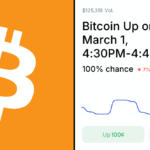A prominent player in the crypto derivatives market has garnered significant attention after executing a major short position amid a turbulent market environment. This trader, known as 0xb317, recently orchestrated a staggering $163 million leveraged perpetual contract to short Bitcoin (BTC) on Sunday. This move follows the successful liquidation of a prior position, where the trader reportedly made $192 million just prior to a market downturn triggered by a tariff announcement from former President Trump.
Currently, the newly established 10x leveraged short position is showing a profit of $3.5 million, though it stands to be liquidated if Bitcoin reaches $125,500. The remarkable timing of the trader’s previous position, which was opened a mere 30 minutes before the tariff news, has led many in the crypto community to label this entity an “insider whale.” Speculation abounds that their trades significantly influenced the market, leading to a substantial leverage flush that decimated cryptocurrency prices over the weekend.
One observer highlighted the unusual nature of the trading patterns: “The crazy part is that he shorted another nine figures worth of BTC and ETH minutes before the cascade happened.” This prompted discussions about potential undisclosed activities on centralized exchanges (CEXs) which might have amplified the impact of the whale’s actions.
The fallout has not been insignificant, with over 250 wallets reportedly losing millionaire status on Hyperliquid since the crash occurred. Further complicating matters, another trader has taken a more bullish stance by opening a 40x leveraged long position of $11 million in Bitcoin.
In light of these events, some analysts are expressing growing concerns regarding the integrity of unregulated crypto markets. Janis Kluge, a researcher affiliated with SWP Berlin, commented, “Crypto people are realizing today what it means to have unregulated markets: Insider trading, corruption, crime, and zero accountability.”
Adding to the controversy, the Binance exchange has been scrutinized for its potential role in the market turmoil. Reports surfaced suggesting that its order books and market maker mechanisms failed during this critical time, resulting in mass liquidations as stop-loss orders did not execute properly. Binance, however, has countered these claims, describing the incident as a “display issue” rather than a crash.
In a statement to users, Binance emphasized that its core futures and spot matching engines remained operational during the event. Despite denying that the issues with certain tokens—such as USDE, BNSOL, and WBETH—contributed to the market chaos, the exchange has offered around $283 million in compensation to those adversely affected, particularly traders who were liquidated while holding these assets as collateral.
Amid the market fluctuations, Binance’s own cryptocurrency, BNB, has experienced a robust recovery, surging 14% within 24 hours to surpass the $1,300 mark once again.








